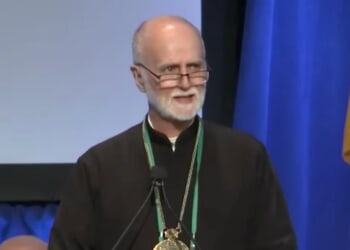Last Saturday, I ran by a cafe where my wife had set me up with a free cup of coffee a day. I spotted the table where a half-dozen men were gathered to talk about Elisabeth Elliot’s Suffering Is Never for Nothing. I’d been tipped off the day before, and I thought I’d bring a sampling of books on the problem of evil. I’d just taught a course on it at New Saint Andrews College in Idaho, and, as a Wheaton prof in the 1970s, I’d walk past a relief sculpture of Elliot’s martyred husband, Jim, each day as I headed into chapel. He, along with other missionary grads, had been speared by the Waorani Indians in Ecuador, the story told in her 1957 book, Through Gates of Splendor.
Turns out, the “book club” hadn’t yet made it to her work on suffering since one of them had brought some of his own writing on “critical thinking,” and they gave him first place in the discussion. I could stay only a minute, but I picked up on his disdain for the sort of spiritually-acute and edifying talk Elliot had delivered through her decades of Christian witness. He sketched an epistemic pyramid, with the base devoted to the deliverances of our senses. He drew a line across, halfway up, saying that items beyond our immediate empirical kin were not fit objects for serious discourse, unicorns, for instance. I thought he’d declare himself “agnostic,” but he proceeded to label transcendent claims “false.”
Of course, in this, he violated his own claim, since he’d made a declaration regarding the “above and beyond.” Not even esteemed British philosopher (and promiscuous fool) A. J. Ayer went this far. His “logical positivism” insisted that all statements unamenable to scientific verification were “meaningless.” Sensible critics soon charged him with self-referential inconsistency: What scientific procedure could confirm the declaration that scientific procedures were the exclusive paths to knowledge and wisdom? Ayer, an avid adulterer, said that the judgment, ‘Adultery is wrong,’ is no more than emoting — “Adultery. Boo!” The same went for God talk and aesthetic judgments: All pious nonsense. And, so, as an Oxford prof, he built a career on impious nonsense.
As I said, I had to bail out of the discussion right off, but I did suggest that our critical thinker had already reached metaphysical conclusions, and that a dispositional analysis of his beliefs showed that he was a functional atheist, having made a big, fraught, life choice. I didn’t bring up the philosophical notion of IBE (Inference to the Best Explanation), but he should be challenged on his conclusion that, all things considered, the splendors of creation, the seeming power of prayer (both internally and externally), the cultural fruit of Judeo-Christian values, signs of God’s providential work (from Dunkirk to the reclamation of a drunken spouse), etc., it is still reasonable to champion a godless universe. And yes, there are many other things to say, including citation of Ian Ramsey’s (Oxford prof and Anglican bishop of Durham) notion of “eschatological verification” — “You insist on knock-down evidence. Just you wait.”
Again, we’re awash in impious nonsense. And more and more obviously, it’s killing us (as well as millions of our unborn babies). Literally.
We Wrestle Not Against Flesh and Blood…
To this point, just yesterday, a couple of hours before Charlie Kirk was assassinated in Utah, a Nashville friend forwarded an article on the newly released pages of the Covenant School shooter’s diary. She (not “he”) called herself the “Devil’s apprentice.” Then we have the Annunciation Catholic Church shooter (“he,” not “she”) in Minneapolis, who mocked Christ in his writings/drawings. And, of course, fresh on our minds is the horrific stabbing of the young woman, a Ukrainian immigrant, on the Charlotte train. And perhaps you heard of the retired, Auburn, lady prof who was stabbed in an Alabama park last Saturday.
In our therapeutic society, the automatic response is to say that we need to dig into the “root causes” of such violence, that we need to enlist mental health professionals to “get them help,” and such. So, the account goes, they’re the victims of some baleful, social or psychotic force, and, quite possibly, the objects of their violence contributed to the attack. I suggest that we dig even deeper, for, as the Bible says, in the final analysis, “We wrestle not against flesh and blood, but against principalities, against powers, against the rulers of the darkness of this world, against spiritual wickedness in high places.” Yep, Paul is talking about Satan and his minions. He’s also urging struggle, which many seemed to have abandoned. They can’t just plead victimhood. They’ve capitulated and left the keys in the ignition.
No doubt, we’re embodied creatures, susceptible to palliation, stimulation, or debilitation, whether from Percocet, cappuccino, or sleep apnea. Yes, shame, depression, resentment, and dozens of other emotional fevers can push us in ruinous directions, but we have so many examples of those who soldiered through thanks to the grace of God. I think, for instance, of former slaver, John Newton, who neither made excuses for his past nor despaired of redemption, but wrote “Amazing Grace,” while his friend, William Cowper, who’d suffered from chronic melancholy and had contemplated suicide, was able to pen the words to a beloved hymn, “God moves in a mysterious way his wonders to perform.” They could have wallowed in their memories, regrets, and confusions, letting moods pilot their choices, but they marshalled their holy, God-given resources to direct their ways.
And then there’s the devil, mocked as a fiction, by people of whom he makes a mockery.
A useful summary of our challenge is that we’re up against “the world, the flesh, and the devil.” (By the way, the Greek word for “world” or “universe” is cosmos, from which the Soviets got ‘cosmonaut,’ and which also plays into ‘cosmetics,’ the arrangement we employ to order our appearance.) The Bible teaches that we’re fallen creatures, sinners by nature and by choice — “the flesh is weak,” prone to go slumming or wilding. As for the cosmos, the world, it’s the spiritual analogue (or even the territory) of what we call, in political terms, The Swamp. It’s the vast, interlocking assembly of purposes for misdirection.
And then there’s the devil, mocked as a fiction, by people of whom he makes a mockery. You can’t respect the Bible and deny the existence of this vile person and his stinking demons. Moderns will try to deconstruct these texts, explaining them away as the precious accounts of primitives grappling with id, projection, Oedipal anguish, or whatever. But if you want to say the Gadarene swine as a herd were so beset with neuroses or psychoses that they drowned themselves, then knock yourself out. But that dog won’t hunt; or rather, those pigs won’t sink.
So, anyway, we’re in fix, with all sorts of wicked challenges swirling about us in the form of power plays against our well-being, lies to enlist us in the wrong armies (with Satan being “the father of lies”), solvents to wash away our common sense, insults to Holy Scripture, and distractions from “the good, the true, and the beautiful.” And through these challenges, a great many Americans have gone catatonic, allowing themselves to be stripped of God-given scruples. They don’t know their Bibles. They don’t know how to run a “reduction to absurdity” on a conceit that’s befuddling and poisoning them — or when they run it, they don’t recognize the base absurdity as absurd.
To be sure, as Romans 1 and 2 teach us, the creation order announces itself to our minds and the Law/Torah is written on our hearts, with our consciences primed to say properly, “No way” or “Okay,” as the case may be. And there are tens of thousands of verses in the Bible to steer us clear of the ditches. But, for one feculent reason or another, we abandon responsible behavior and “act out” woefully, whether buying into stupid language, voting for willfully toxic but charming morons, turning a blind eye to obvious inanities, acceding to daft narratives, and covering our little, status/career-obsessed hindquarters at the price of cowardice.
Yes, there is such a thing as demon-possession. Some of this is in play in the land. But there’s a lot more demon-celebrated abdication — leaving the keys in the ignition of a running car as you crawl into the back seat for a nap, or scooting over with, “I’ll let you drive.” And the devil is only too happy to oblige.
That being said, I’ve been hearing and reading recently of a fresh movement of God on college campuses and of crowds gathering in the name of the Lord in civic spaces. It could be the case that, as the 19th-century hymn puts it, “Mercy drops round us are falling.” So, with the songwriter, I add “But for the showers we plead.”
READ MORE from Mark Coppenger:




![Gavin Newsom Threatens to 'Punch These Sons of B*thces in the Mouth' [WATCH]](https://www.right2024.com/wp-content/uploads/2025/08/Gavin-Newsom-Threatens-to-Punch-These-Sons-of-Bthces-in-350x250.jpg)
![ICE Arrests Illegal Alien Influencer During Her Livestream in Los Angeles: ‘You Bet We Did’ [WATCH]](https://www.right2024.com/wp-content/uploads/2025/08/ICE-Arrests-Illegal-Alien-Influencer-During-Her-Livestream-in-Los-350x250.jpg)








